Table of Contents
Reading hundreds of business books during my entrepreneurial trip has taught me something valuable. These must-read books give more than temporary lessons – they provide timeless principles that lead to lasting success. Sun Tzu’s strategic wisdom in “The Art of War” and Jim Collins’ work in “Good to Great” have rightfully earned their spots on CEOs’ desks.
This piece will show you ten influential business books that help leaders build successful companies consistently. Leaders use these books to develop strategic thinking and welcome innovation. These books serve as proven roadmaps that guide businesses toward excellence.
Why Business Books Matter for Leadership Success
Business leaders who read approximately 500 pages daily stay ahead of market trends and make better decisions. This practice has become significant for leadership development and strategic growth, according to recent studies.
Building strategic thinking skills
Modern business leaders need strategic thinking to handle complex challenges. Business books provide frameworks and methods that help develop this vital skill. Leaders who read business literature regularly show better pattern recognition, systems point of view, and structured problem-solving abilities.
The insights offered in the Best Business Books of All Time: Why CEOs Keep These 10 Classics on Their Desk are integral for leaders seeking to enhance their strategic capabilities and decision-making processes.
Business books are powerful tools that develop mental agility and political savvy. These books help executives become skilled at “strategic patience” through carefully selected case studies and real-life examples – a vital skill that ensures long-term success.
Learning from others’ experiences
Business books are a great way to get insights from accomplished leaders and industry pioneers. They give readers a chance to learn from both successes and failures without the associated risks. A detailed analysis of 191 high-potential executives showed that most leadership development happens through experiential learning and understanding others’ experiences.
The most effective business books present:
- Practical frameworks for handling relationships
- Methods for setting and implementing strategic agendas
- Approaches to reinforce fundamental executive skills
- Techniques for developing core business values
Gaining competitive advantage through knowledge
Companies with well-read executives show stronger market positioning and innovative capabilities. Knowledge gained through business literature directly associates with competitive advantage. These leaders know how to:
- Identify emerging market opportunities
- Anticipate potential threats
- Make data-driven decisions
- Implement effective organizational changes
Business books excel at helping leaders understand how various business disciplines intersect. This detailed understanding leads to better strategic planning and execution. Executives who read business books regularly handle complex organizational challenges better and streamline processes.
Business literature helps leaders develop a broader point of view on industry trends and market dynamics. This expanded outlook helps them make informed decisions and create innovative solutions to business challenges.
How Top CEOs Choose Their Reading List
CEOs who excel at their jobs pick their reading materials with great care to learn and gain strategic advantages. A Harvard study shows that high-performing CEOs read up to four books monthly to be proactive in their industries.
Decision-making criteria
Top executives have a clear method to choose books for their reading lists. They give priority to materials that line up with their strategic goals and business challenges. Studies show that CEOs often read book summaries before deciding which ones deserve their full attention.
Business leaders also think over:
- Books with fresh points of view on leadership and management
- Volumes their trusted peers and mentors suggest
- Publications about current market trends and state-of-the-art ideas
- Works that show how insights apply across industries
Reading habits and routines
Smart time management is a vital part of a CEO’s reading routine. These executives set aside specific times to read each day, usually early in the morning or during their commute. A newer study shows that CEOs dedicate 5-6 hours daily to reading various materials from financial documents to industry publications.
Leaders who succeed blend reading into their busy schedules through several methods:
- Morning Focus: CEOs often spend 30-60 minutes reading before their workday starts.
- Commute Optimization: Many listen to audiobooks or review digital content while traveling.
- Quality Over Quantity: Instead of trying to read everything, top executives choose influential books that match their business needs.
The most successful CEOs create the right environment to learn. They set up dedicated reading spaces and use spare moments between meetings or flights to absorb new information. McKinsey’s research shows that successful leaders make reading a key part of their daily leadership growth.
Reading isn’t just a solo activity for these leaders. They often head over to book clubs or discussion groups that serve two purposes: they keep reading habits consistent and promote deeper understanding of the material. Some leaders, like Jeff Bezos, have started monthly book clubs with their senior leadership teams.
Research proves that CEOs with regular reading habits show better pattern recognition and strategic thinking. Studies confirm that executives who read regularly are better at spotting emerging trends and making smart decisions about their company’s future.
Strategy and Warfare Classics
Military strategy classics give business leaders powerful lessons about mastering competition. Sun Tzu’s “The Art of War” ranks among the most influential business books. Leaders have drawn inspiration from its strategic principles through the centuries.
The Art of War’s modern applications
Sun Tzu’s teachings focus on preparation, knowledge, and adaptability – ideas that strike a chord with today’s business challenges. His message about winning without direct conflict remains relevant as companies try to capture market share through smart positioning.
The book’s timeless wisdom shows up in several key areas:
- Strategic Planning: Sun Tzu stressed the importance of careful preparation, which lines up with modern business planning. Companies like Netflix that study their market terrain carefully tend to win.
- Competitive Intelligence: The idea of “knowing yourself and knowing your enemy” directly relates to understanding your company’s strengths and what competitors are doing.
- Resource Optimization: Sun Tzu’s advice helps businesses make the most impact while cutting waste.
Competitive strategy insights
Michael Porter’s groundbreaking work “Competitive Strategy” builds on these classical ideas and offers a well-laid-out approach to analyzing industries. His framework has changed business strategy theory and practice worldwide. CEOs consider it essential reading.
Porter’s competitive strategy centers on:
- Industry Structure Analysis: Companies that understand the forces driving industry competition can position themselves better.
- Competitive Positioning: Businesses need to carve out distinct positions that give them lasting advantages against tough competitors.
- Value Creation: Porter’s framework shows how competitive advantage leads to profit, offering a fresh view on creating and sharing value.
Of course, Sun Tzu and Porter’s principles work well together. A good example is how Sun Tzu’s advice to avoid direct fights matches Porter’s emphasis on finding unique market positions. This explains why leaders from Mao Zedong to modern CEOs have studied these works so closely.
Real examples show these strategies at work. Netflix spotted its content delivery strengths and Blockbuster’s weak spots, which led to completely reshaping the video rental industry.
Microsoft shows the power of mutually beneficial alliances through partnerships with Adobe, SAP, and LinkedIn. These team-ups have expanded Microsoft’s products and customer base, proving that ancient strategic wisdom still works in today’s digital world.
Books on Building Lasting Companies
Success strategies alone won’t build companies that last. Some of the best business books focus on creating organizations that stand the test of time. These books are a great way to get proven frameworks that lead to green practices and lasting effects.
Good to Great’s key principles
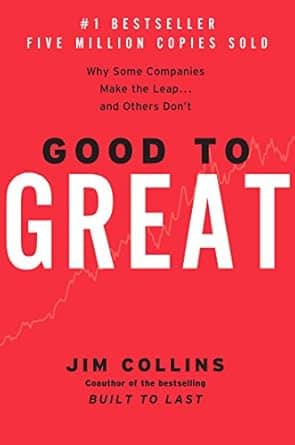
Jim Collins’ research showed that companies jumping from good to great outperformed the general market by 6.9 times over fifteen years. His team analyzed 1,435 companies and found significant principles behind extraordinary performance.
Level 5 Leadership sits at the core of this transformation. These executives blend professional will with personal humility. They start by getting the right people “on the bus” and the wrong people “off the bus”.
The research found three key elements that lead to lasting success:
- Looking at hard truths while keeping steadfast dedication
- Knowing what creates economic success (the Hedgehog Concept)
- Building momentum through consistent, disciplined action
Built to Last’s success factors
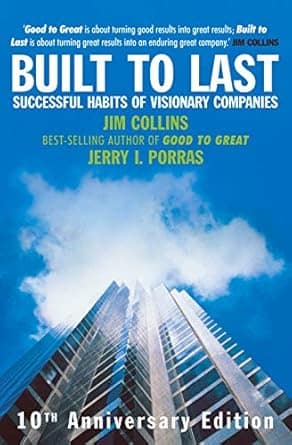
Jim Collins and Jerry Porras spent six years on detailed research. They compared 18 visionary companies with their competitors. These visionary companies showed amazing results by outperforming the general stock market by 15 times since 1926.
Their study revealed several unique traits of lasting organizations:
Clock Building vs. Time Telling: Successful companies build strong institutions instead of depending on charismatic leaders. They create systems that last beyond any single leader.
Core Ideology: Visionary companies keep strong core values while pushing for progress. Collins puts it well: “profit is like oxygen – necessary for life but not the purpose of it”.
Scaling Up essentials
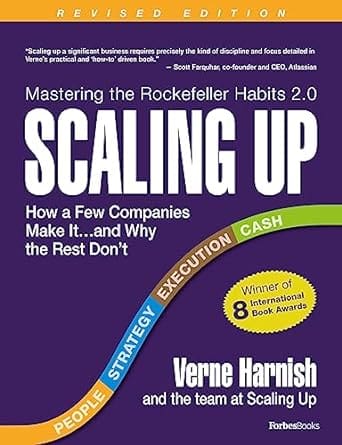
Verne Harnish’s Scaling Up framework lays out basic principles to grow businesses. The method looks at four key decisions: People, Strategy, Execution, and Cash.
Companies using these principles have achieved impressive results. Their combined client revenues reach USD 42 billion yearly. The framework highlights:
Disciplined Approach: Scaling works best with proven tools. More than 70,000 companies worldwide use the One-Page Strategic Plan and Rockefeller Habits Execution Checklist.
Performance Metrics: Companies should track key financial indicators like revenue, gross profit margin, and cash flow patterns. Regular checks of these metrics help maintain stable growth.
Cultural Alignment: Systems and processes matter, but scaling also needs strong organizational values during rapid growth. This alignment helps companies keep their core while moving toward big goals.
Leadership Philosophy Must-Reads
Modern business success stems from timeless leadership principles found in influential books that have proven their worth over time. Two remarkable books stand out for their powerful effect on leadership philosophy.
7 Habits’ enduring wisdom
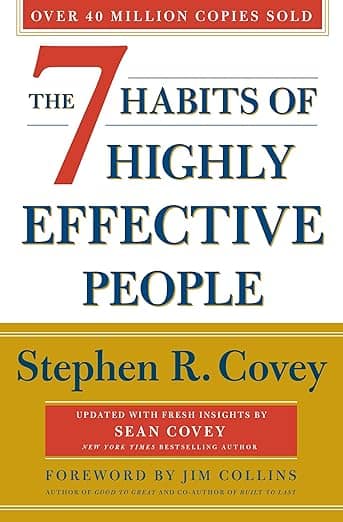
Stephen Covey’s masterpiece “The 7 Habits of Highly Effective People” has changed millions of lives worldwide through principles of fairness, integrity, honesty, and human dignity. The book has managed to keep its bestseller status for over three decades and has helped countless people surpass trends and pop psychology.
These seven habits create a path toward leadership excellence:
- Be Proactive: Taking responsibility for one’s reactions and experiences
- Begin with the End in Mind: Creating personal mission statements and making decisions based on principles
- Put First Things First: Prioritizing important tasks over urgent ones
- Think Win-Win: Seeking mutually beneficial solutions in relationships
- Seek First to Understand: Using empathetic listening to build trust
- Synergize: Combining strengths through positive teamwork
- Sharpen the Saw: Maintaining sustainable effectiveness through renewal
The book’s influence reaches beyond personal growth – President Bill Clinton invited Covey to Camp David in 1994 to apply these principles during his presidency.
Developing emotional intelligence
Studies show emotional intelligence directly affects organizational performance. About 71% of employers value EQ more than technical skills. Leaders with high emotional intelligence excel in four key areas:
Self-Awareness: A leader’s understanding of personal strengths and weaknesses leads to better decisions and team guidance. Studies show only 10-15% of people truly know themselves, though 95% think they do.
Self-Management: This significant skill helps leaders direct stressful situations while keeping a positive outlook. Data shows empathetic leaders score 40% higher in coaching, engaging others, and decision-making.
Social Awareness: Leaders who show empathy and understanding can better grasp workplace dynamics. Managers who demonstrate empathy toward their direct reports receive better performance ratings from superiors.
Relationship Management: Good relationship skills encourage breakthroughs, collaboration, and trust. Research reveals that unresolved conflicts waste about eight hours of company time in unproductive activities.
As we explore the Best Business Books of All Time: Why CEOs Keep These 10 Classics on Their Desk, we uncover the foundational concepts that can steer organizations toward sustained success.
Emotional intelligence grows more valuable as organizations see its effect on team performance and business results. Leaders who use emotional intelligence create environments where employees feel valued, understood, and motivated to excel.
Innovation and Change Management
Business leaders face their biggest challenges in understanding market dynamics and adapting to change. Two groundbreaking business books give remarkable insights into innovation and organizational transformation.
Crossing the Chasm’s market insights
Geoffrey Moore’s seminal work gets into the vital gap between early adopters and mainstream markets. His research shows that technology enthusiasts and visionaries make up roughly 16% of the market. Companies need strategic precision to reach pragmatic customers across this divide.
The book highlights three key elements needed to cross this challenging divide:
- Compelling use cases that pull market interest
- Complete product solutions
- Word-of-mouth communities that strengthen marketing messages
Moore’s framework puts emphasis on picking strategic market segments. Research shows that pragmatists, who make up one-third of the overall market, want productivity improvements without risk and buy only from proven market leaders. Companies that understand this dynamic can guide their transition from early adoption to mainstream success.
Innovator’s Dilemma lessons
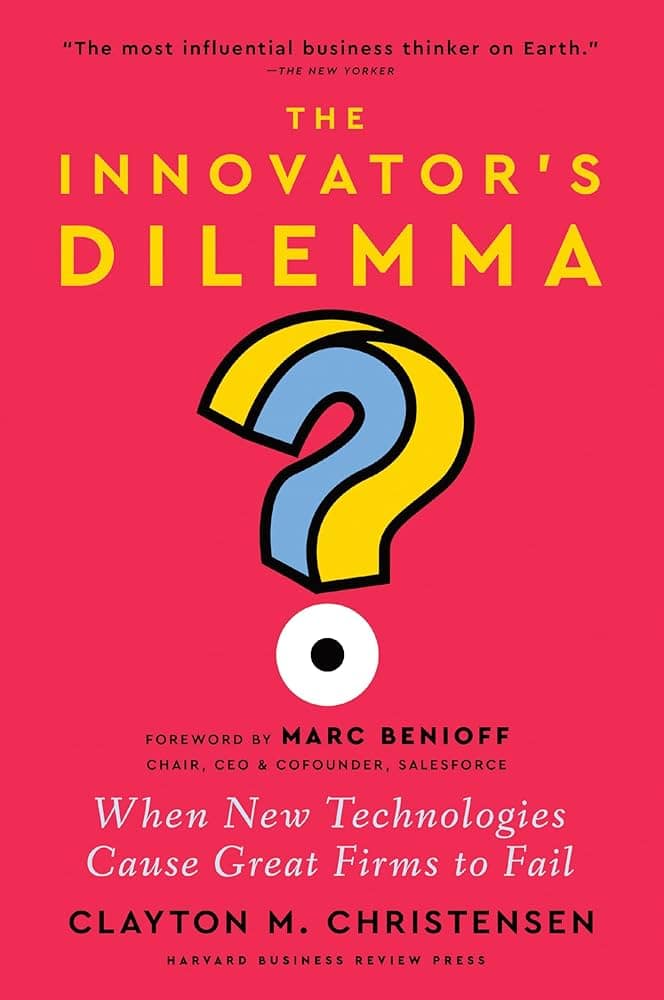
Clayton Christensen’s revolutionary work explains why successful companies fail to stay ahead of disruptive innovation. His research proves that good management practices – the same ones that lead to success – ended up causing failure when facing technological disruption.
The biggest problem lies in finding balance between existing operations and emerging opportunities. Studies show that 80% of chief strategy officers believe their current business models face significant risk. This creates a fundamental dilemma:
Market Leadership Paradox: Established companies excel at serving existing customers through small improvements. But this focus often blinds them to disruptive innovations that start with lower quality alternatives and grow faster to threaten market leaders.
Strategic Innovation Requirements: Research shows successful companies must create separate units for disruptive innovation. These units need freedom to experiment without organizational limits. They should maintain:
These best business books symbolize the wisdom and strategies that successful leaders apply to navigate their organizations through complexities and uncertainties in the modern business landscape.
- Independent operational structures
- Distinct performance metrics
- Freedom to explore new business models
Kodak’s story shows the book’s lasting relevance. The company invented the first megapixel camera in 1986. But its deep roots in traditional photography stopped it from embracing digital transformation. This cautionary tale proves that companies must recognize and act on disruptive trends, whatever their current market success.
These two books prove that success in innovation needs more than just technological expertise. Leaders must understand market dynamics, customer psychology, and organizational barriers to change. These books are a great way to get guidance on handling technological disruption and market progress.
Personal Development Essentials
“The most convincing sign that someone will achieve new results in the future is new behavior in the present.” — Steven Bartlett, CEO and founder of Social Chain, author of The Diary of a CEO
Personal growth is the life-blood of business success. Research shows that CEOs who prioritize self-development are 2.4 times more likely to outperform their peers. The best business books of all time include several that have changed how we approach personal mastery.
Think and Grow Rich principles
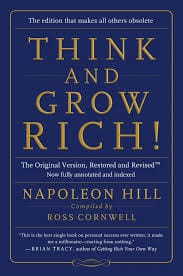
Napoleon Hill’s masterpiece draws from interviews with over 100 successful individuals. The book reveals basic principles to achieve material and personal success. Success starts with a definite purpose – what Hill calls the “Chief Definitive Aim.”
Four essential elements drive personal achievement:
- Desire: Creating clear, written goals reviewed twice daily
- Faith: Maintaining unwavering belief in achieving objectives
- Specialized Knowledge: Remaining open to learning and new ideas
- Organized Planning: Taking persistent action until goals materialize
Hill’s research shows that successful people employ their subconscious mind through positive self-talk and visualization. The concept of the “Mastermind” – surrounding yourself with supportive, like-minded individuals – is vital to speed up personal growth.
Mindset mastery techniques
Research shows that leaders with a growth mindset are 35% more likely to dynamically reallocate resources and adapt to changing circumstances. Effective mindset development includes several key areas:
Embracing Challenges: Leaders who see obstacles as opportunities show higher resilience and innovation potential. Companies with growth-minded leaders create more innovative and collaborative cultures.
Continuous Learning: Top-performing CEOs spend much time on personal development. Research shows that 94% of millennials invest in skill enhancement to benefit their careers. This commitment to learning links directly to better decision-making and strategic thinking abilities.
Building Resilience: Organizations led by resilient leaders are nearly three times more likely to rank in the top quartile of organizational health. Key resilience-building practices include:
- Developing strong support networks
- Maintaining work-life balance
- Staying focused on long-term objectives
Emotional Intelligence: Leaders with high EQ perform 40% better in coaching and decision-making roles. Managers who show empathy receive higher performance ratings from their superiors.
Personal mastery needs consistent effort and dedication. CEOs who read and learn regularly show superior pattern recognition and strategic thinking abilities. Personal development ended up being a catalyst for both individual and organizational success. This creates a positive ripple effect throughout the business ecosystem.
Marketing and Customer Psychology
Customer psychology is the life-blood of business success, and books about consumer behavior are among the must read business books for leaders. Research shows that 66% of consumers expect companies to understand their needs and expectations. These psychological insights have become crucial in modern business.
Understanding human behavior
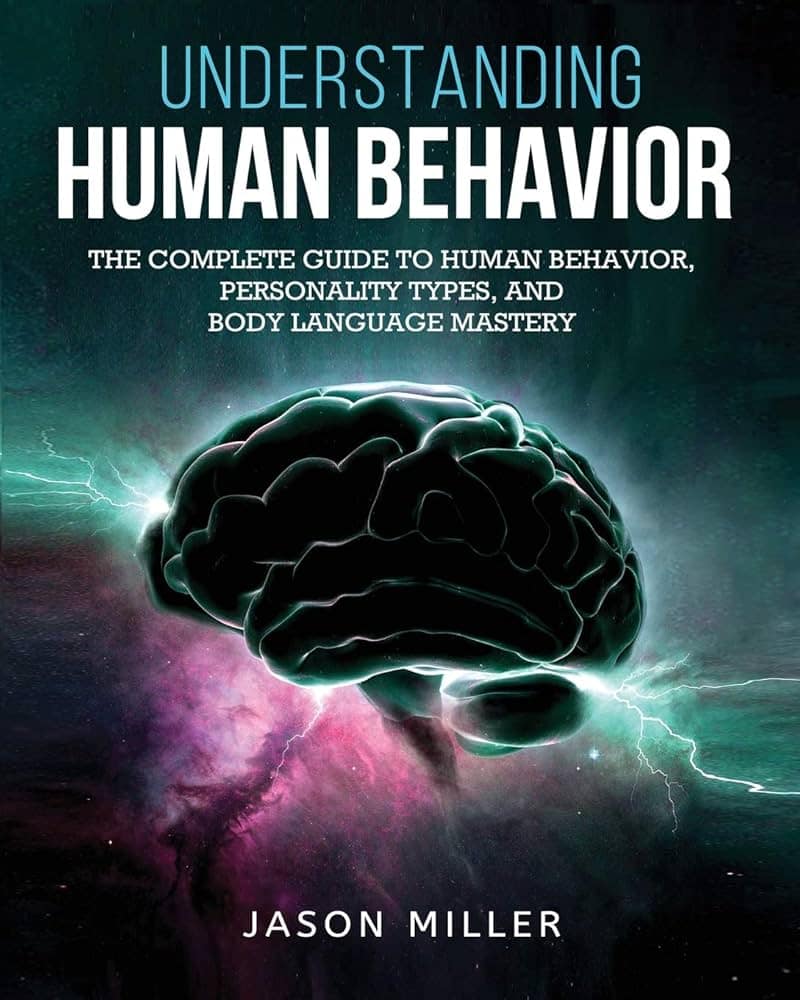
The sort of thing I love about consumer behavior analysis is how it reveals patterns that shape business outcomes. Studies indicate unique purchasing priorities across generations – Gen X spends 11% more than boomers and 33% more than millennials. Millennials, representing 82 million people in the U.S. population, contribute USD 600 billion annually to the economy.
Marketing psychology includes several principles that influence consumer decisions:
- Priming: Environmental cues shape subsequent responses
- Reciprocity: People feel compelled to give back when they receive something
- Social Proof: People follow behaviors of those they trust
- Lack: Limited availability makes things more valuable
- Loss Aversion: People fear losses more than they value gains
Research shows 60% of millennials choose products that express their personality. Gen Z relies heavily on social media influencers for recommendations and prefers mobile payments.
Building customer loyalty
Customer loyalty develops through behavior pattern understanding and consistent value delivery. Studies reveal 84% of people want brands to create engaging content through storytelling and useful solutions. A single negative experience can make all but one of these customers abandon a brand they love.
Long-lasting customer relationships need these strategic elements:
Informed Insights: Companies that learn about customer data show stronger market positioning and innovative capabilities. This knowledge helps them:
- Identify emerging opportunities
- Anticipate potential threats
- Make informed decisions
- Implement effective changes
Emotional Connection: Research indicates 62% of customers believe brands should care more about their priorities. About 60% of consumers would buy more if they felt cared for by a brand.
Customized Experiences: Studies reveal two-thirds of customers believe companies should listen better to feedback. Organizations that successfully analyze customer behavior can create tailored experiences that encourage deeper emotional connections and repeat business.
Customer loyalty psychology goes beyond traditional marketing approaches. Market research analysts guide marketing campaigns, and their field should grow 20% from 2018 to 2028. These professionals bring unique insights to optimize advertising campaigns and present them effectively in different formats and media.
Financial Wisdom and Wealth Creation
Money management skills are the life-blood of entrepreneurial success. Research shows CEOs spend about 2 hours of their free time reading and learning each day. Business books are a great way to get knowledge about creating wealth and managing finances.
Rich Dad Poor Dad insights

Robert Kiyosaki’s revolutionary book questions traditional money advice. He shows the clear difference between working to earn money and letting money work for you. The book explains that real wealth comes when you own businesses that run without your direct involvement.
Key principles from the book include:
- Living below means and saving money to invest
- Knowing what makes something an asset or liability
- Building strong financial knowledge
- Setting up multiple income streams
The numbers speak for themselves – 88% of millionaires built their wealth from scratch. This proves these financial principles work when applied correctly. Kiyosaki’s lessons show that owning a business remains one of the best ways to create wealth in America.
Wealth building strategies
Building wealth needs both business sense and smart financial planning. Research shows entrepreneurs who follow organized wealth management plans get better results over time.
Five basic strategies stand out to build lasting wealth:
Diversification Beyond Business: Smart entrepreneurs don’t keep all their money in one place. They spread their investments across stocks, bonds, and real estate.
Cash Flow Management: Personal and business money should stay separate. Research proves having emergency funds helps handle changing income patterns.
Strategic Tax Planning: Business owners build more wealth when they understand tax benefits and deductions. The data shows working with professional tax accountants leads to improved financial results.
Asset Protection: Studies indicate proper legal structures help protect personal assets from business risks.
Retirement Planning: More than a third of entrepreneurs have no retirement savings. The successful ones treat themselves like employees and create proper retirement plans without traditional job benefits.
Financial knowledge goes beyond just working with numbers. Research shows entrepreneurs who lack financial literacy find it harder to build wealth. Learning financial basics through essential business books helps ensure long-term success.
Modern Business Transformation Books
Digital transformation has become essential to survive in the business world that’s changing faster than ever. A McKinsey study shows that 90% of organizations have started their digital transformation journey. This makes books about business modernization a must-read for leaders who want to stay ahead.
Digital age adaptation
Business transformation today requires a detailed grasp of state-of-the-art technologies and their strategic rollout. About 70% of companies now use hybrid or multicloud management technologies. AI continues to reshape how businesses operate at their core.
Three vital elements drive successful digital transformation:
- Clear Strategy Focus: Organizations should focus on specific areas that create real business value
- Technical Talent: Companies need their own engineering experts and can’t rely solely on outsourcing
- Expandable Operations: Teams that bring people together from different parts of the company are vital to implementation
Studies show companies that successfully transform score 33% higher on innovation compared to those at the bottom. All the same, about 87.5% of digital transformations don’t succeed. This shows why expert guidance through literature matters so much.
Future-proofing organizations
Smart organizations know that future-proofing goes beyond just adopting new technology. McKinsey explains that AI-driven algorithms will power more than 50% of user interactions by 2024. This calls for strategic planning ahead.
Key factors for organizational resilience include:
Data-Driven Decision Making: Global data will grow to more than 180 zettabytes by 2025. Data literacy is vital for business success. Organizations should build analytical skills to control this massive growth effectively.
Cultural Transformation: Successful transformation needs organizations to question existing practices and welcome experiments. Leaders should promote environments where state-of-the-art ideas work alongside operational excellence.
Talent Development: Nearly 50% of Gen Z uses generative AI tools in their personal and professional lives. Organizations should adapt their talent strategies to use this tech-savvy workforce while keeping human approaches central.
The business world ended up facing speeds up to 100 times faster with 5G networks. Companies must stay flexible to adopt emerging technologies. A detailed understanding of digital transformation principles helps organizations build strong frameworks that can handle future disruptions and grab new opportunities for growth and innovation.
Conclusion
The Best Business Books of All Time: Why CEOs Keep These 10 Classics on Their Desk are essential reads for any aspiring leader who wishes to cultivate a deeper understanding of effective management and strategic foresight.
Business books are great tools that help create excellent leaders and shape successful organizations. I’ve seen how these classics change strategic thinking and propel development in sustainable ways.
These ten essential business books go beyond theory and provide practical frameworks that business leaders have tested for generations. Each book brings unique views that still matter today – from Sun Tzu’s strategic principles to modern insights about digital transformation.
My research reveals that top leaders don’t just read these books once. They study them many times to extract core principles and apply them methodically. The evidence is clear: companies with well-read executives hold stronger market positions and perform better than their rivals.
Note that reading business books is an investment in your leadership growth. Pick a book that helps with your current challenges first. Learn its principles by putting them into practice, then work through other books systematically. These time-tested classics have already shown the way to business excellence.
FAQs
Q1. What are some essential business books every CEO should read?
Some must-read business books for CEOs include “Good to Great” by Jim Collins, “The Lean Startup” by Eric Ries, “The 7 Habits of Highly Effective People” by Stephen Covey, “Zero to One” by Peter Thiel, and “The Art of War” by Sun Tzu. These books offer timeless principles on leadership, strategy, innovation, and personal effectiveness.
Q2. How do business books contribute to leadership success?
Business books provide frameworks for strategic thinking, offer insights from experienced leaders, and help develop critical skills like decision-making and problem-solving. They also expose leaders to new ideas, industry trends, and best practices that can give them a competitive edge in the business world.
Q3. What reading habits do successful CEOs typically have?
Successful CEOs often dedicate specific time for reading, such as early mornings or during commutes. Many read 4-5 books per month and create structured environments for learning. Some participate in book clubs or discussion groups to engage more deeply with the material and foster a culture of continuous learning within their organizations.
Q4. How can leaders apply insights from business books to their companies?
Leaders can apply book insights by identifying relevant principles, adapting them to their specific business context, and implementing them systematically. This might involve creating action plans, sharing key concepts with their team, or using the books’ frameworks to analyze and improve various aspects of their business operations.
Q5. Are there any drawbacks to relying too heavily on business books for guidance?
While business books offer valuable insights, over-reliance can be limiting. It’s important to balance book knowledge with practical experience, stay open to new ideas beyond popular literature, and remember that not all advice applies universally. Leaders should critically evaluate concepts and adapt them to their unique business situations rather than following book advice blindly.










